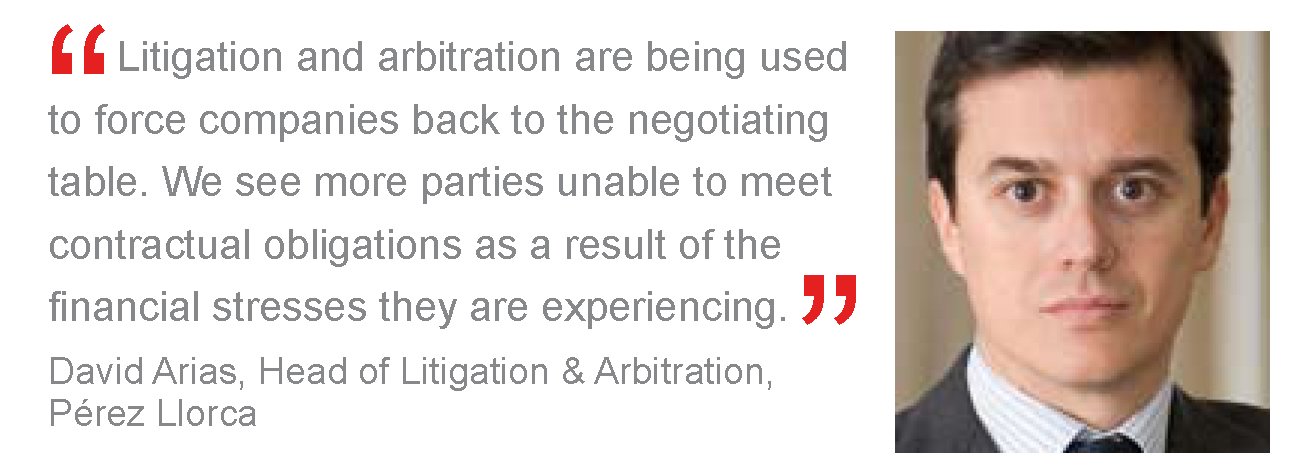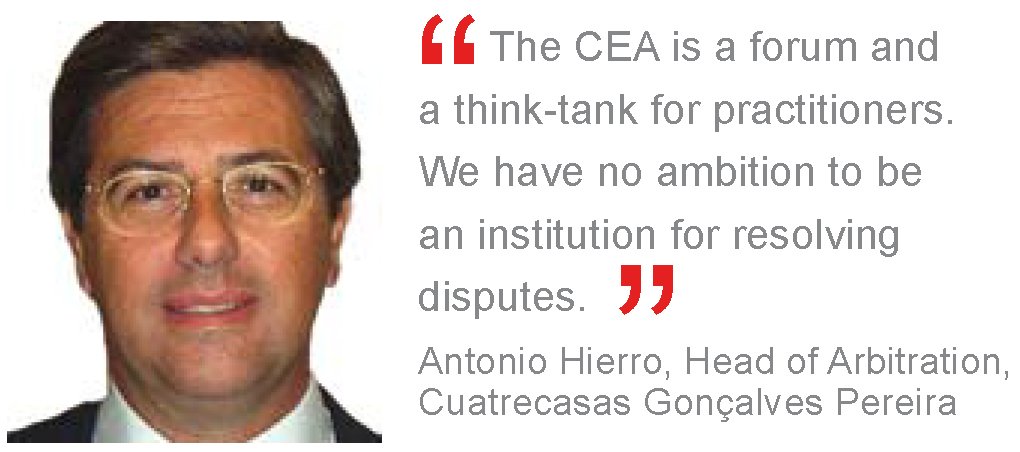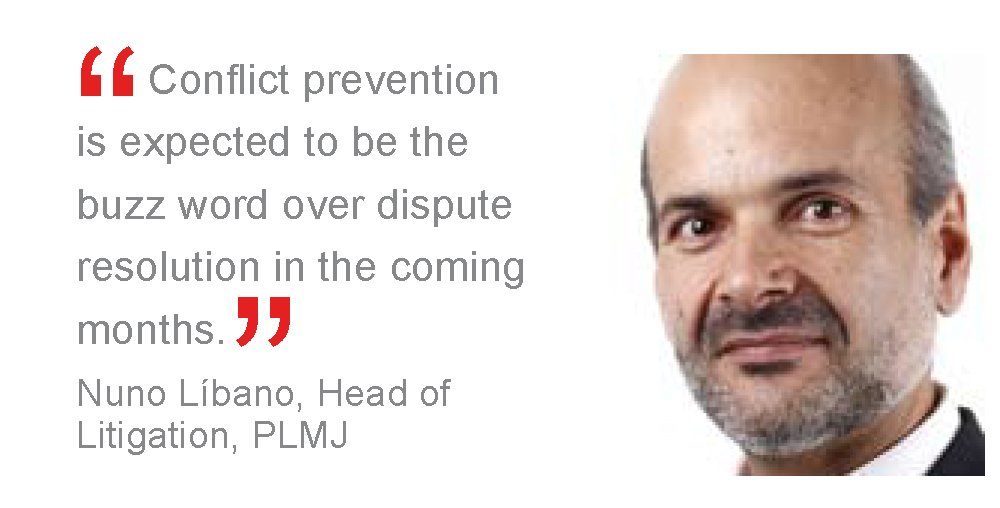Dispute Resolution Report 2011: Putting all the pieces together
Según los expertos en Derecho procesal y arbitraje, la crisis financiera ha traído nuevos retos a las empresas de la Península ibérica y ha aumentado el número de conflictos en las negociaciones y los contratos. Para los abogados, está claro que los clientes están más dispuestos a recurrir a mecanismos formales de resolución de conflictos para renegociar términos contractuales.
“There has been an upturn in disputes across all sectors and an increased use of litigation as a ‘tactical’ weapon. Litigation and arbitration are being used to force companies back to the negotiating table. We see more parties unable to meet contractual obligations as a result of the financial stresses they are experiencing,” says David Arias, Head of Litigation and Arbitration at Pérez-Llorca.
Alongside an inevitable increase in insolvency-related disputes, lawyers report rising tensions among company shareholders over strategic differences and values, and a huge rise in claims against banks and financial institutions for mis-selling products, including relating to the Madoff scandal and Lehman Brothers’ collapse.
“From our experience, there has been a clear increase in litigation related to financial products, opposing clients and financial entities, and real estate. On top of this the number of insolvencies involving restructuring of companies and assets has increased significantly,” says Frederico Gonçalves Pereira, Head of Litigation at Vieira de Almeida.
Nuno Líbano Monteiro, Head of Litigation at PLMJ agrees. “There is a constant flow of restructuring, insolvency and disputes work and we expect this to increase in 2011.”
Yet to come, say lawyers, is the fall-out from the budget cuts and austerity measures imposed by the Spanish and Portuguese Governments, including the cancellation or delay of major projects, and specifically in Spain the reduction of the tariffs paid to some energy producers.
“Put simply, the economic situation is generating more disputed negotiations, more disputes and more difficulty in resolving disputes amicably,” says Cliff Hendel, partner with Araoz & Rueda in Madrid.
 Forced arguments
Forced arguments
Among the most significant trends emanating out of the downturn is companies litigating in situations which they would not have only a few years ago. “In some cases, we see companies literally digging up old contracts to bring claims. The result is often complex disputes based on forced arguments which require very intense work and dedication when confronted in court” says José Luis Huerta, Head of Disputes and Managing Partner at Hogan Lovells in Madrid.
All sectors have been affected and almost all clients have faced an increased need to resort to dispute resolution in order to collect credits, says Francisco Colaço, partner at Albuquerque & Associados in Lisbon. Litigation is also increasing in business sectors less affected by the downturn.
“Over the past two years we have seen increased commercial disputes especially in the pharmaceuticals sector, where the fight between innovative and generic manufacturers is the order of the day, likewise in intellectual property,” says Sandra Ferreira Dias of Franco Caiado Guerreiro.
Despite the evident larger number of actions being launched, some however question how many claims are actually progressing to final judgement. “The number and relevance of judicial and arbitral disputes has not been as significant as one would have expected. In this respect, we have noticed that many clients try to find faster and cost-effective solutions even if that implies having to waive some of their claims,” says Carlos de los Santos Lago, Head of Dispute Resolution at Garrigues in Madrid.
The situation is the same in Portugal, believes José Alves Pereira, Managing Partner of Alves Pereira & Teixeira de Sousa. “The crisis has not given rise to a significant number of cases actually before the courts, where fees are notoriously expensive and a high value dispute requires a significant amount to be paid upfront, huge delays and an unpredictable result.”
International resolutions
The financial crisis and economic downturn at home may have helped push more Spanish and Portuguese companies to new international markets, but some of these opportunities will ultimately come undone. A rise in international business leads to a rise in international disputes, but lawyers note that businesses are not planning for a “worst case” scenario.
“We see relatively little evidence that international businesses are preparing for any negative eventualities. In this respect, General Counsel are often very ‘reactive’. It is only when a dispute arises that they look at how to manage the issues that have arisen,” says Miguel Virgós, disputes partner with Uría Menéndez in Madrid.
His firm is now advising clients to adopt an ex ante dispute resolution policy. “This is an effective way to anticipate and control issues that are otherwise difficult to manage in the complex international scenarios that companies inevitably face.”
Clients may prefer to refer to arbitration for cross-border disputes, but many times the jurisdictional or arbitration clauses are poorly drafted, do not take into account the nature of the dispute, the seat or the applicable law.
Latin America has been a long-time focus of both Spanish and Portuguese businesses, and it is within the region that lawyers see the most consistent number of international disputes. But besides the everyday challenges of operating in such markets there are also political risks.
The “creeping nationalisation” policies enacted by Governments in Bolivia, Ecuador and Venezuela mean businesses have to be alive to both commercial and administrative changes, says Bernardo Cremades, of B Cremades & Asociados in Madrid. “It is no coincidence that the greatest number of new arbitration claims initiated before ICSID last year related to South America. Nearly a third of all cases involve Latin America, double what they were in the previous year.”
The dynamism of the Brazilian economy, and the infrastructure boom ahead of the 2014 World Cup and 2018 Olympìc Games, is acting as an almost irresistible magnet, say lawyers. But so too are continuing growth of markets like China and India.
“We have had clients with arbitration proceedings in China and Brazil that have not only raised complex legal problems – can an award really be enforced in China against a Chinese company – but also cultural issues, such as how to best tackle evidence or cross-examinations and depositions,” says Alejandro Fernández de Araoz at Araoz & Rueda.
Brazil is inevitably a point of focus for Portuguese companies, but so too are African lusophone countries like Mozambique, Cape Verde and particularly Angola. However, few major international arbitrations have emerged beyond the tourism and construction sectors, say lawyers.
Taking on the world
A challenge for Iberian firms is therefore not only how to capitalise on the upturn in litigation and arbitration at home, but whether they have a role to play in the disputes that their clients increasingly face as they expand internationally. This is particularly so in Latin America, where the global UK and US firms have achieved prominence.
In disputes under Spanish or Portuguese law there is a clear need for Iberian lawyers, but this requirement is much less apparent where investments are structured under UK, US or local law; or in large international arbitrations drawing on Anglo-Saxon procedural principles, such as discovery and cross-examination in English.
For some leading arbitration firms, the emphasis has been towards building their arbitration expertise, working alongside local firms in places like Latin America as co-counsel, and adding “international” practitioners. Cristian Conejero, the former Counsel for Latin America and the Iberian Peninsula in the International Chamber of Commerce, now leads the Latin American arbitration practice at Cuatrecasas, while Uría Menéndez has recruited Virginia Allan as Counsel.
“Spanish firms in general are now prepared to act in emerging markets and to better utilise our networks,” says Borja de Obeso, partner at Gómez-Acebo & Pombo in Madrid.
Some suggest however that there is an inherent capability gap between the capabilities of domestic and international firms, with the latter inevitably better placed to manage multi-jurisdictional disputes. “The reason is obvious: it is much easier to work with a colleague from a different office than to liaise with a foreign law firm. We have had some recent experiences, both in litigation and arbitration, which have confirmed this impression,” says Francisco Málaga, a disputes partner at Linklaters but formerly with Cuatrecasas.
Despite the international growth of Iberian firms in recent years, others accept that more needs to be done to be able to compete for the largest multi-jurisdictional client mandates.
“International markets such as London, New York or Hong-Kong do not look at Iberian law firms as an option,” says Gonzalo Serrano Fenosolla, partner with Roca Junyent in Barcelona. “The best way for firms to demonstrate their ability to handle international disputes is to increase their presence in these markets, improve personal contacts with potential clients and try to compete on quality.”
Nonetheless, a number of arbitrators continue to stand out on the international scene in part because they have not focused on Spanish or Portuguese-led disputes, among the most prominent Bernardo Cremades and Juan Fernández-Armesto.
Spain has also notably seen the emergence of a number of dedicated litigation and arbitration boutiques, among them Hamilton Abogados and more recently Moscardó & Asociados – and as a result of the departure of co-founder Gonzalo Stampa, G Stampa Abogados. “It is important not only to be independent, but to be seen to be independent,” says Fernández-Armesto.
The international challenge is perhaps even harder for Portuguese firms. “Our focus must perhaps be more specific, toward disputes involving African countries, and not necessarily only the Portuguese speaking ones,” says Gonçalves Pereira at Vieira de Almeida.
It is Sub-Saharan Africa that now accounts for over a quarter of new claims before ICSID, and where a number of Portuguese firms have strong alliances or have established their own satellite offices. “For disputes in Portuguese-speaking countries, we are very well prepared to be a legal hub, for judicial and cultural reasons, especially regarding Brazilian, Angolan and Mozambique disputes,” says Paulo Farinha Alves, litigation partner at PLMJ.
Alternative dispute resolution
Iberian companies´ appetite for arbitration internationally contrasts significantly with the domestic reality, admit lawyers. This is even though both the Spanish and Portuguese courts are currently awash with insolvency litigation, which has helped bring an already slow litigation process to a virtual standstill.
The creation in Spain of dedicated Commercial Courts in 2007 helped concentrate business claims before specialist judges but the same courts have jurisdiction over bankruptcy claims. Likewise in Portugal the Commercial Courts are overwhelmed, while the creation of a specialist arbitration forum like ARBITRARE for IP disputes, and new arbitration procedures for tax matters, have yet to take off, say lawyers.
In Spain, there is a continuing perception of high costs, a lack of impartiality of arbitration panels, and the award of more “equitable” and less “legal” judgements particularly in disputes with major Spanish companies or institutions, experts acknowledge. “The one-bite-at-the-apple approach of arbitration may also be off-putting to Spanish clients accustomed to a court system involving factual review at the appellate level, and thus in practice two bites at the apple,” suggests Hendel at Araoz & Rueda.
Arbitration institutions are however looking to react to users concerns. Madrid’s Arbitration Court (La Corte de Arbitraje de Madrid) and Barcelona’s Arbitration Tribunal (Tribunal Arbitral de Barcelona – TAB) have notably both made efforts to make their institutions more transparent, open up their lists of arbitrators, and get closer to business.
“Arbitration Courts need to explain clearly the value of their costs and highlight the importance of achieving a real termination to a conflict. With the current reduction of resources within the justice system, the deadlock of cases in the traditional Courts will increase so it is key to have alternative methods to resolve disputes,” says TAB President Jesús María de Alfonso.
In Portugal anecdotal evidence suggests a steady upturn in domestic disputes. “We feel that more businesses are taking advantage of the flexibility of commercial arbitration to tailor dispute-specific processes that reflect the business priorities of the parties. Commercial arbitration can emulate court litigation if that is what the parties want, or if their arbitrator or their counsel is not familiar with the process,” says Pedro Metello de Nápoles, partner at PLMJ.
Spanish companies are particularly reluctant to resort to mediation and other alternative dispute resolution (ADR) methods because of cultural reasons, say lawyers. “Businessmen tend to believe that they resort to litigation when they have exhausted all possible solutions in negotiation, and it would probably be a waste of time to go through a new negotiation with the help of a mediator,” says Carlos de los Santos Lago, Head of Disputes at Garrigues.
The downturn may yet however help change this sentiment, suggest some. Spain’s Ministry of Justice is drafting a Mediation Act (implementing EU Directive 2008/52/EC, of 21 May 2008) that will for the first time legitimise the process and make agreements enforceable.
“International clients remain much readier than domestic clients to accept and explore alternative resolution methods such as arbitration and mediation, although some domestic clients are gradually accepting them, mainly in technical sectors,” says Fernando González, partner with Squire Sanders Hammonds in Madrid.
Conversely lawyers in Lisbon say that mediation is already more developed because of the inefficiencies of the court system. “There is a general trend towards adopting arbitration and mediation clauses; the novelty now is to resort to mediation as a dispute resolution method, following its success in common law systems – itself prompted by the increasing costs and ‘judicialisation’ of arbitration,” says José María Corrêa de Sampaio, partner with Abreu Advogados in Lisbon.
Client pressure
Opinions differ however whether Spain and Portugal have yet seen a peak in the volume of disputes emanating from the crisis. Some suggest that companies are still waiting for signs of a recovery before bringing actions; either because they cannot afford it or because enforcement will provoke the insolvency of the debtor.
In difficult economic times more companies may have more disputes but their ability to fund them is under greater pressure too, say lawyers. “This has produced a demand to find more creative solutions in the design of strategies aimed at facilitating parties’ settlement discussions, without undermining their legal positions,” says de los Santos Lago at Garrigues.
ch a scenario may yet therefore help push companies domestically towards more informal ADR methods, suggest others. Claims may be launched but relatively few General Counsel want to spend their legal budgets pursuing or defending them.
“The cost of proceedings is frequently no longer sustainable for some companies, which prefer settling on bad conditions than going on with fairly good cases. Arbitrators too are sometimes reluctant to order claimants to pay a deposit, meaning that we are seeing some file huge ill-founded claims in order to compel their competitor to allocate substantial financial resources to the proceedings,” says Jean-Marie Vulliemin, who leads the Madrid office of Swiss firm Froriep Renggli.
Some lawyers are therefore looking for new ways not only to progress actions, but also to fund them. Some markets have already seen the arrival of investment funds, that will support litigation and arbitration claims, and buy enforcement awards.
Law firms may therefore be seeing an increase in the volume of work they are experiencing but economic pressures are changing the way clients want to retain their services. Litigation work may have increased substantially but its profitability has not. “Clients are seeking to negotiate closed budgets, while cost-cutting and doubts surrounding the solvency of the debtor make it more frequent for the parties to reach settlement agreements in terms that, in other moments, would not have been acceptable for the creditor,” says Mercedes Fernandez at Jones Day.
Bankruptcy disputes may have been the major driver of disputes practices in recent years but the spread of “infection” across the wider economy has meant firms are now facing a broader range of disputes. “Even if firms have a naturally strong bankruptcy practice, litigation and arbitration practices are traditionally solid probably more than any other law service. There is now significant demand in sectors such as energy and telecoms, but also in areas such as antitrust and competition law where we have seen a notable increase of matters,” says Raul da Veiga, partner at Gold Abogados in Madrid.
The wider acceptance of commercial arbitration and the rise in the number of experienced arbitrators and arbitration counsel represents an opportunity for Iberian businesses to more effectively manage their dispute budgets, and for Iberia’s law firms to move further out into the international arena, say lawyers.
“Clients are cost conscious, with an eye on reducing costs and improved cost management when it comes to conflict management and resolution. Conflict prevention is expected to be the buzz word over dispute resolution in the coming months. However arbitration remains king in the international arena, all other dispute resolution methods are marginal,” concludes Líbano Monteiro at PLMJ.
Arbritation on the global stage
Lawyers agree that more effort needs to be made to promote arbitration not only among Iberian businesses, but also internationally. At the forefront of current efforts to promote Spain as a seat for international disputes, and the capabilities of Spanish law firms, is the Club Español del Arbitraje, which has sought to focus practitioner sentiment and promote awareness of Spain’s UNCITRAL-modelled 2003 Arbitration Law at home and abroad.
Having now achieved some of its domestic goals, in raising awareness of arbitration among domestic businesses, the CEA has now to be more ambitious, say some members.
But in promoting Spanish arbitration it must look to complement not compete with institutions such as the AAA, ICC or LCIA, or the major arbitration bodies now emerging across Latin America, says its President, and Head of Arbitration at Cuatrecasas Gonçalves Pereira, Antonio Hierro. “Our goal is to promote Spanish-language arbitration, and Spain as a seat for international arbitration. The CEA is a forum and a think-tank for practitioners. We have no ambition to be an institution for resolving disputes.”
Much remains to be done before Madrid or even Barcelona are as well-known or as frequently-used seats as London, Paris or Geneva, but the combined efforts of the CEA has already helped raise the visibility of Spain internationally.
The challenge going forward however is how best to co-ordinate these international efforts and to work alongside other arbitration institutions, and arbitration communities, say some. The CEA has now established 15 international chapters – first in Lisbon, but subsequently across Latin America, in the US and now elsewhere in Europe.
“The establishment of international chapters is a step in the right direction. You cannot attract international disputes without becoming a truly international institution, you have to involve other relevant members from the international community,” says Álvaro Lobato, disputes partner with DLA Piper in Madrid.
The international chapters have already helped contribute to the creation of an Iberian-American arbitration community, suggest some, drawing in lawyers well beyond Spain.
“This community will not in itself constitute competition to bodies such as the AAA or the ICC, provided that these are willing to abide with the ambitions and concerns of Iberian-American parties. Notably among these is ensuring that the arbitrators they appoint actually understand the language or are familiar with the law systems involved,” says Pedro Metello de Nápoles a partner with PLMJ in Lisbon.
For others, the CEA is already showing results. “We can see that the promotion of arbitration is achieving its objective of increasing the amount of international arbitration in Iberia, not by transferring disputes from other arbitration centres such as the ICC, but by increasing the number of arbitrations worldwide,” says Tito Arantes Fontes, partner with Uría Menéndez also in Lisbon.
A question of enforcement
Alongside an upturn in disputes, the downturn has also brought an increase in the challenges parties face in enforcing awards, say lawyers. “In many jurisdictions, Spain included, the instruments provided to achieve enforcement are clearly insufficient, and the result is the frustration of the client. Many debtors file for bankruptcy as soon as enforcement comes close,” says Francisco Málaga, Head of Litigation at Linklaters in Madrid.
The enforcement of judgments in Spain also faces procedural barriers. The Judicial Office and, in particular, the Notification Service and the Investigation of Property Service are slow in processing awards, says Jesús Carrasco, partner with Squire Sanders & Hammonds. “In Madrid the Notification Service is so slow it causes the suspension of proceedings.”
Most cases of opposition to enforcement in domestic litigation involve underlying insolvency situations, but the strategy to be employed cannot be left to the very end of a case, and especially for international disputes, say others.
“The challenge for the enforcement of international awards remains convincing parties to consider the issue at the initial project phase – before even making an investment or drafting a contract,” says Álvaro Lobato, a disputes partner with DLA Piper in Madrid.
The issue is particularly acute in emerging markets, agree others. “The enforcement of international awards in countries with a fragile court system always presents problems; some such as Angola still haven’t signed the New York Convention on Enforcement of International Awards, which clients must be aware of when preparing and structuring investments,” says José María Corrêa de Sampaio, partner with Abreu Advogados in Lisbon.
Angola does have a bilateral agreement with Portugal while similarities between Portuguese and Angolan legislation may help overcome some problems, say others. “Enforcement proceedings in Angola, like Mozambique, do not happen very often but when they do it usually takes a long time, so alongside court proceedings alternative solutions are usually looked for,” says Sandra Ferreira Dias, of Franco Caiado Guerreiro & Associados.
Mozambique now has a Centre for Commercial Arbitration, Conciliation and Mediation (CACM) but developing countries can be suspicious of enforcing foreign awards, says Sónia Teixeira da Mota, Co-Head of PLMJ’s Africa Desk. “Angola is however relatively liberal in this respect compared with a number of other non-convention countries in Africa. The Government is aware that its non-convention status is not very well regarded.”
But enforcement issues continue to arise elsewhere. “Much more attention has to be paid to those countries that have withdrawn themselves from the international legal landscape, such as Bolivia and Ecuador, which have withdrawn from ICSID and brought into question the ability to enforce awards adjudicated within the scope of international investments,” says Manuel Barrocas, of Barrocas Advogados in Lisbon.












